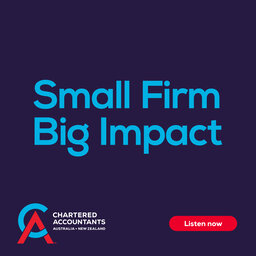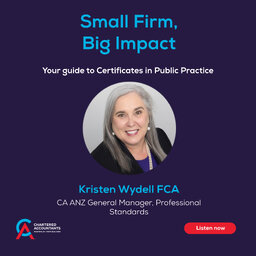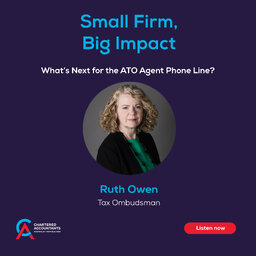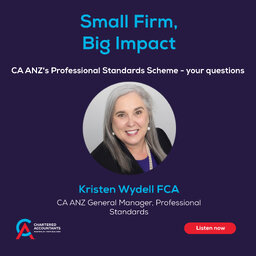Climate-related disclosures, the impact on businesses and the role of accountants is front of mind right now. The International Sustainability Standards Board (ISSB) has released its first two standards: IFRS S1 General Requirements for the Disclosure of Sustainability-related Financial Information and IFRS S2 Climate-related disclosures.
The standards establish a baseline of sustainability disclosures, enabling companies to provide decision-useful sustainability information to capital markets.
So while the initial focus might be on the big end of town, there IS a crucial role for SMPs to play.
This episode with Chartered Accountants ANZ Sustainability and Business Reform Leader Karen McWilliams FCA explains why smaller and medium sized practice Members should care and the impact heading their way.
Sustainability offers a great opportunity for CA ANZ Members to support their clients and to build their knowledge in this space and wait until you see the resources.
As promised, Gillian and Karen have compiled the list below.
HELLO RESOURCES (!!):
CA ANZ Media Release on the ISSB’s first two standards
Action by SMEs is key to a more sustainable world
New insights give small businesses practical sustainability tools
New sustainability guide for not-for-profits and charities
Australian Treasury consultation – climate-related financial disclosure: Second consultationAustralian Treasury consultation – climate-related financial disclosure: Second consultation
Sustainability assurance – seize the opportunity
CA ANZ launches Carbon Accounting FAQs
Sustainability Roadmap - Chartered Accountants Worldwide
MICRO COURSES:
Sustainability essentials - micro course (charteredaccountantsanz.com)
Sustainability reporting - micro course (charteredaccountantsanz.com)
 Small Firm, Big Impact
Small Firm, Big Impact


